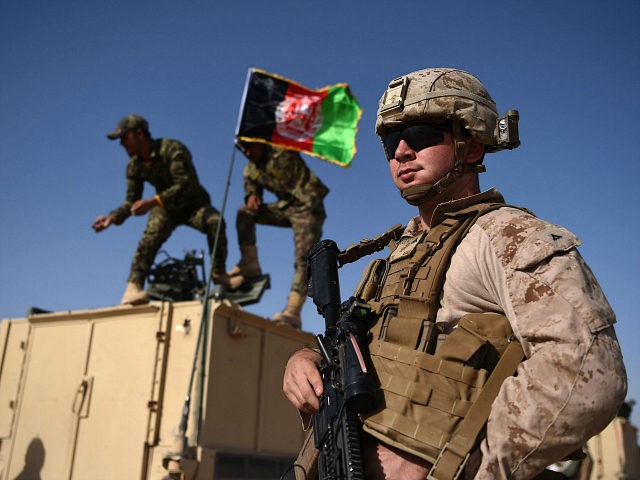Inadequate oversight for the U.S. taxpayer-funded $83 billion effort to develop the Afghan security forces has led to a waste of money and hindered the training and capabilities of the war-ravaged country’s troops, an American watchdog agency revealed this week.
Despite the tens of billions of dollars devoted to the development of the Afghan National Defense and Security Forces (ANDSF) since the war began in October 2001, the troops continue to suffer from capability lapses, suffering a historic number of casualties primarily at the hands of the Afghan Taliban. The ANDSF includes military and police units.
Taliban narco-jihadis control or contest about half of the country, more than during any other time since the U.S. ousted the group’s regime soon after invading the country in 2001. The Taliban remains the most prominent group in Afghanistan even though the Pentagon believes the region is home to the highest concentration of terrorist groups in the world.
In a lessons learned report released Thursday, the U.S. Special Inspector General for Afghanistan Reconstruction (SIGAR), a congressionally-mandated agency that oversees America’s $133 billion nation-building effort, noted:
After 17 years of U.S. involvement in Afghanistan and security-related U.S. appropriations totaling $83.3 billion (approximately 63 percent of the nearly $133 billion of U.S. reconstruction funding), there is not one person, agency, country, or military service that has had sole responsibility for overseeing security sector assistance (SSA). Instead, the responsibility for security sector assistance was divided among multiple U.S. and international entities. … The mission also lacked an enduring and comprehensive plan to guide its efforts.
John Sopko, the SIGAR chief, revealed that, despite the level of spending, “no U.S. executive branch department or military service” was responsible “for assessing progress toward meeting U.S. strategic objectives, or accountability for vetting and deploying experts to accomplish mission tasks.”
SIGAR blasted the American government’s refusal to involve the Afghans in key decisions involving the multi-billion dollar effort to develop the local forces.
A former commander from the U.S. training mission in Afghanistan told SIGAR, “The Afghans were informed and directed, not asked or consulted.”
“As a result, the United States has implemented systems that the Afghans will not be able to maintain without U.S. support,” SIGAR pointed out.
U.S. President Donald Trump’s administration has intensified efforts to negotiate peace with the Taliban, making the political reconciliation between the terrorist group and the Afghan government the top goal of its strategy to end the nearly 18-year-old war.
Taliban narco-jihadis, however, remain reluctant to allow Kabul to participate in the talks. The Taliban, which is fighting to establish a sharia-compliant Islamic emirate, considers itself the only legitimate government of Afghanistan, dismissing Kabul as an American “puppet.”
Taliban terrorists claim they will sit down with Kabul after the full withdrawal of foreign troops.
The Taliban and the U.S. have reportedly reached a draft agreement for the withdrawal of foreign forces in exchange for counterterrorism assurances from the narco-jihadi group. Both sides still have to work out the details, including the timeline, of the agreements.
President Trump has expressed a desire to bring home the estimated 14,000 American troops who remain in Afghanistan. The Taliban has opposed U.S. proposals to leave behind a residual force to ensure the terrorist group keeps its promise to prevent its ally al-Qaeda and rival Islamic State (ISIS/ISIL) from operating in Afghanistan.

COMMENTS
Please let us know if you're having issues with commenting.